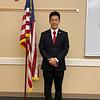“Today we are engaged in a final, all-out battle between communistic atheism and Christianity.” The date was February 9, 1950. Senator Joseph McCarthy was delivering his notable speech entitled, “Enemies from Within” in front of a crowd in Wheeling, West Virginia. McCarthy's speech and his character as a staunch anti-Communist politician as well as a United States Senator from Wisconsin will forever remain famous, or infamous in American government and politics, depending on your perspective.
But fast forwarding to today, we are hard-pressed to find anybody speaking like McCarthy, let alone a young person from our generation. Switching on the television, we are no longer bombarded with calls against Communism, the Soviet Union, and Red China, but instead with calls to action for racial justice and freedom of speech. Just 70 years ago, during the Second Red Scare, our country was focused on eradicating Communism, Socialism, Marxism, and the like from America.
Just 15 years later, there were massive protests against President Lyndon B. Johnson's decision to send American troops to Vietnam, an obscure Southeast Asian country to combat the North Vietnamese Communist forces threatening to launch an invasion and establish a Socialistic government.
Eventually, in 1973, during the Presidency of Richard Nixon, intense public pressure and scrutiny led to a withdrawal of American troops from Vietnamese soil, leading to the Fall of Saigon on April 30, 1975, formally ending the Vietnam War with a North Vietnamese Communist victory. This drastic shift, mainly due to the coming of age of the young generation at the time, within two decades since the Second Red Scare, marked one of the greatest transitions in the American geopolitical landscape. Today, the political rhetoric in the United States has become centered on social justice, activism, freedom of speech, abortion rights, as well as other topics that would never have generated a meaningful discussion less than a century ago.
So, as the once-radical Baby Boomers have aged over the decades, how has America changed throughout the years? Throughout the generations, how has America become an increasingly politically polarized country? How do the views of young Americans today differ from those of older citizens who once believed differently? To answer these questions, we must explore the political trends of recent generations leading back to the Silent Generation, which saw the rise of modern politics in American society.
Let us slide into your dms 🥰
Get notified of top trending articles like this one every week! (we won't spam you)Modern Partisanship
Political polarization and partisanship have become ingrained in our modern culture. According to the Pew Research Center, strong political partisanship in Americans has increased from 10% to 21% within the past two decades alone. Additionally, “…ideological thinking is now much more closely aligned with partisanship than in the past.
As a result, ideological overlap between the [Republicans and Democrats] has diminished: Today, 92% of Republicans are to the right of the median Democrat, and 94% of Democrats are to the left of the median Republican,” (Geiger, 2021). So what can explain the change from just the past two decades alone? Let's use a critical figure in modern American politics to explain this ideological shift. During the first year of Donald Trump's Presidency, 36% of Gen Xers and just 27% of Millennials approved of his job performance, compared to 46% of Silents and 44% of Boomers. Millennials consistently remain as the most dominant leftist and Democratic adult generation in America (not including Generation Z, as some of our peers have not yet reached adulthood).
The same intergenerational division regarding Trump's Presidency is also reflected in other issues commonly dividing the two major political parties today. Our country's population trends can be seen in the Millennial Generation which has become the most racially diverse by far, with over 40% belonging to a minority race, (The Generation Gap in American Politics | Pew Research Center, 2023). Our population continues to become even more diverse, with Generations Z and Alpha now entering the scene.
Perhaps the changing population trends and racial diversity in our younger generations compared to the vastly different monocultural society exposed to our preceding generations has played a part in the shifting of the geopolitical landscape and the intergenerational differences existing between the older and younger generations. However, if we closely examine past trends, it can be quickly discovered that the generational behavior of our younger generations is not uncommon, nor is it unprecedented.
Take the Quiz: Which Indian city is the perfect holiday spot for you!?
Let's match you with an Indian city that you would love!
Political Trends in Preceding Generations
When referencing the Baby Boomer Generation today, we rarely think of them as a liberal generation. Yet, in “1969, far more in the 18- to 29-year-old age cohort — the front end of the baby boom — called themselves Democrats (35%) than Republicans (21%).
A decade later, when they were 28 to 39 years old, their identification with the Democratic Party over the GOP was even stronger (45% to 19% in Gallup’s surveys),” (Bowman & Rugg, 2011). However, beginning in 1980, they began to take a more Conservative approach as they came of age and started their own families, cementing their family-oriented and religious approach to life, values more commonly espoused by the modern Republican Party.
During the massive counterculture movement of the 1960s and 70s, also known as the Hippie Movement, the Baby Boomer generation became known by older generations such as the Silent Generation for being rebellious and unconventional. Indeed, the Boomers were much more liberal on religion, women's rights, and racial issues compared to their parents. However, “[i]n the 1986 Time poll, 64% of the baby boomers polled said they had become more conservative since the 1960s,” highlighting a major shift between their views from before, during the height of the Hippie Movement, (Bowman & Rugg 2011).
When exploring these trends throughout our older generations, it can become easier to develop an understanding of the differences between our generation and theirs. It can also help to explain the shift away from the Red Scares of the early to the mid-20th century. As the dialogue has gradually shifted away from abolition to civil rights to social justice throughout the nearly 250 years of our nation's existence, it can be hard to predict what will happen to our generation and our political views in the future.
What Will Happen Next? Analyzing Trends and Conclusion.
It can certainly be difficult for some of us to understand why our elders act the way that they do and believe in the political systems that they continue to believe in. However, the Baby Boomer and Silent Generations were faced with many hardships that are mostly now irrelevant and obsolete to our Generation.
Coming of age in times of war when drafts were common, our elderly generations endured hardships during the Second World War and Vietnam War, either overseas serving our country, or at home protesting the draft. It is also important for us to remember that our Boomer generation was responsible for much of the progress of the Civil Rights Movement of the 1950s and 60s, leading to significant changes in American society that are still present and evolving today.
To conclude, I would like to include a quote whose theme many of us have heard before and one that seems to come out of the mouth of every older person. “Children; they have bad manners, contempt for authority; they show disrespect for elders and love chatter in place of exercise. They no longer rise when elders enter the room, they contradict their parents and tyrannize their teachers. Children are now tyrants.” Can you guess who spoke these famous words?
This quote, which could have been written by almost any older person, was actually written by Socrates, a famous Greek philosopher who lived from 470-399 B.C.E., over 2,600 years ago. When comparing the shifting geopolitical landscape and the evolving political beliefs of each generation, we can see that most generations tend to shift towards the ideological right with time. So before you criticize our elders, take a moment, and reflect on the fact that you could be very different just a couple of decades from now.
Concluding Thoughts
To understand why Senator Joseph McCarthy is viewed as a polarizing political figure today despite his success in the promotion of the Red Scares during the 20th century, we can reference the shifting tone towards racial inequality. While the abolition of slavery was a major discussion topic in the late 18th to mid-19th century, it has gradually shifted to become a topic of the past; a page from the history books. What was once a major talking point gradually transitioned to a discussion on Civil Rights and Social Justice, an issue that continues to dominate our modern political landscape.
Similarly, discussions around Communism have seemingly become more irrelevant among our younger generations, due to a variety of factors that impacted the geopolitical landscape over time. These same factors contributed to the abolition of slavery in the United States, the 20th Amendment granting women the right to vote, and the 26th Amendment granting all citizens 18 years of age and older sovereignty.
So as we reflect on the intergenerational differences of the present, let's all come to a mutual understanding of history's tendency to repeat itself. Someone who was once as relevant as Joseph McCarthy in the fight against Communism has now become a figure in the history textbooks. Someone who was once as relevant as Socrates in Greek and Western philosophy has now become a figure in the history textbooks.
Someone who was once as relevant as Martin Luther King Jr., or Rosa Parks in the fight against racial segregation and Jim Crow has now become a figure in the history textbooks. Someone who was once as relevant as Abraham Lincoln in the fight against slavery has now become a figure in the history textbooks. To conclude, we should all recognize that generations, as well as the people belonging to them, change over time. To coexist peacefully with our elder generations, we must learn to come to a mutual respect and understanding of their beliefs and traditions, whether they be similar or different to ours. I leave with a call for peace- respect your elders, and perhaps one day, that respect may turn into respect for yourself.
Bibliography
Bowman, K., & Rugg, A. (2011, September 11). As the Baby Boomers Turn. aei.org. Retrieved December 15, 2023, from https://www.aei.org/articles/as-the-baby-boomers-turn/
Geiger, A. (2021, April 9). Political polarization in the American public. Pew Research Center - U.S. Politics & Policy. https://www.pewresearch.org/politics/2014/06/12/political-polarization-in-the-american-public/
The Generation Gap in American Politics | Pew Research Center. (2023, May 22). Pew Research Center - U.S. Politics & Policy. https://www.pewresearch.org/politics/2018/03/01/the-generation-gap-in-american-politics/















